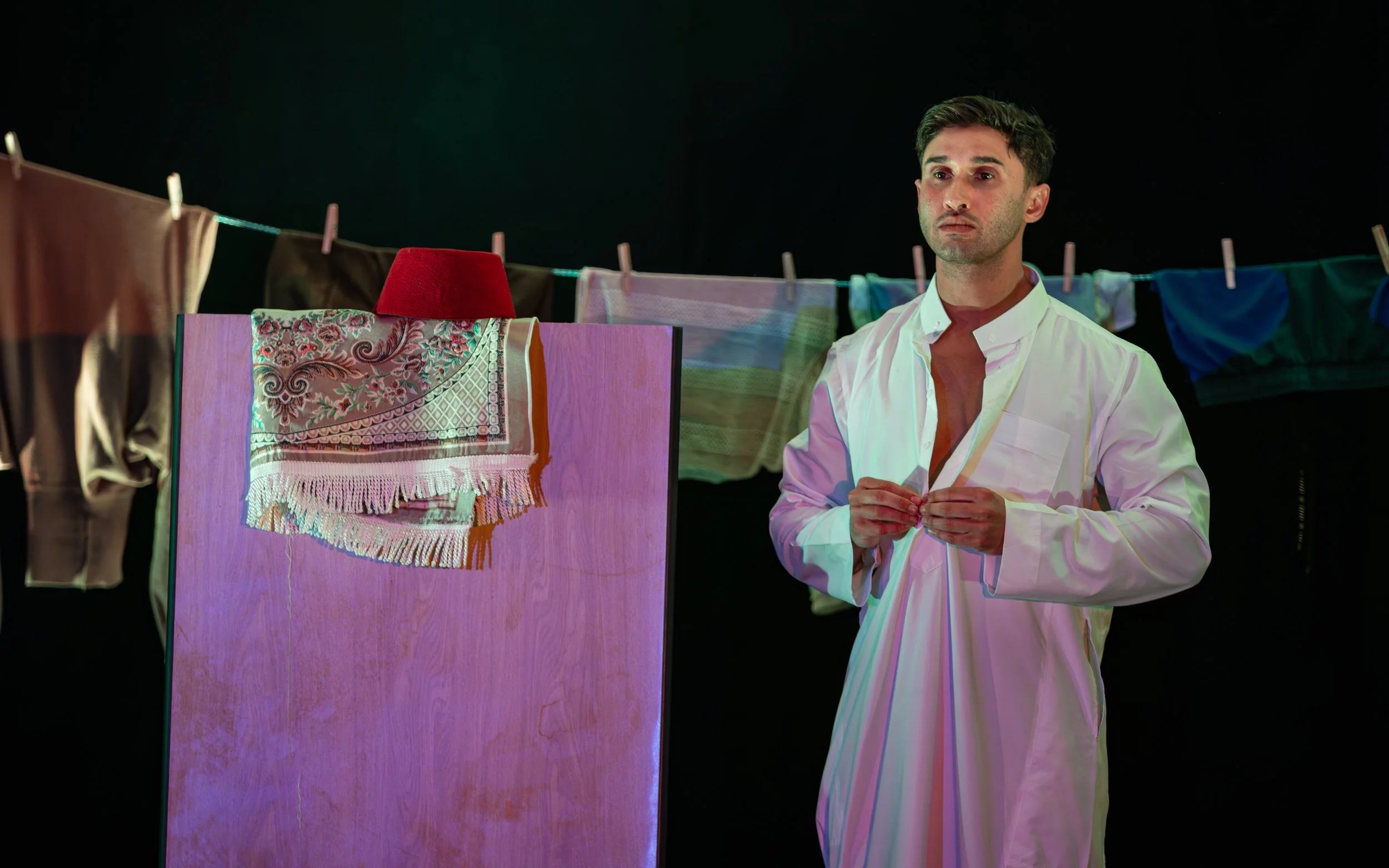Theatre Review: Please, don't call me moffie (dir. Zubayr Charles)
Zubayr and Anzio – creative muses
Photographer: Jeremeo Le Cordeur
By Niamh Ahern
For Stoep Collective
On Wednesday, 30 April, Zubayr Charles's third play, Please, don't call me moffie, debuted at this year's Suidoosterfees. The play gives us a glimpse into the lives of Mushfeeq, Abdullah, Zayn, Eesa, and Haroon—five gay Coloured and Cape Malay friends—and the various ways in which they wrestle with their queer and religious identities. Anzio September brings all five characters to life with his stellar solo performance.
The play opens with Mushfeeq lying in bed and scrolling on his phone. He is turning 30, an age which is often accompanied by a not-quite-quarter-life crisis and contemplation. He recounts a recurring dream about his own death. He can see himself lying dead, being bathed and wrapped in the kafan before being taken to receive the Salat al-Janazah and be accepted into the afterlife.
His monologue is interrupted by a video sent on a group chat with four other friends—Abdullah, Zayn, Eesa, and Haroon. The video is from an “unknown Arab country” and features two gay men crying out whilst being whipped as punishment for their sexuality. All the audience hears is the repeated crack of the whip and a voiceover saying “Al Lutiyah Muharama fie al Islam” (to be deviant is forbidden in Islam). Mushfeeq is horrified, and, after his heartfelt exposition on the tension between his natal—and current—spirituality and sexuality, he decides to go ahead with a Grindr hookup. What follows are four more snapshots into the lives of his friends—Abdullah, Zayn, Eesa, and Haroon—their reactions to the video clip, and their approach to grappling with the same tension.
The set is striking in its simplicity, and is transformed to varying degrees with each metamorphosis undertaken by September. At the centre of the stage is a square table, which, in addition to its function as a dining table, doubles as a bed, a wall in front of which to lift weights, and a doorway to parents’ hushed bedroom conversations. The table is accompanied by two chairs, behind which hangs a washing line which holds all of the characters’ clothes.
With each changeover, September transforms in front of our eyes, accompanied by radio static and, occasionally, some Britney. Each character’s changes in physicality and inflection are strengthened by dramatic lighting design—at some of the more dramatic highpoints, the audience is plunged into darkness punctuated by a single red spotlight or strobe sequence falling on September’s twisted form. The temporal fluidity afforded by the one-man show allows for each character to seamlessly shift between past and present trauma in a way that physically and emotionally immerses the audience in their psyches. Though the play ran for less than one hour, the passage of time seemed to slow during its runtime.
Charles deftly crafts a uniquely South African—dare I say, Capetonian—narrative whilst still paying homage to queer theatremakers past. His deployment and self-professed subversion of gay archetypes—the “Tragic Gay” (Mushfeeq); the tightly-wound trauma babe (Abdullah); the camp entertainer (Zayn), the hypermasculine “Muscle Gay” (Eesa); and the repressed gay steeped in religious orthodoxy as a coping mechanism (Haroon)—harkens back to Mart Crowley’s The Boys in the Band (1968) and, to a lesser extent, Tony Kushner’s Angels in America (1992). Both of these plays utilised a kaleidoscopic cast of characters to play out the tensions of their particular sociopolitical moment—in the case of The Boys in the Band, the point at which homosexuality was on the cusp of partial legalisation in parts of the US whilst still shrouded in immense social shame, and in the case of Angels in America, the 1980s American AIDS crisis.
At the risk of shifting too much of my focus to American narratives, I do think it’s important that Please, don’t call me moffie be put into conversation with these works, both because of its originality and its relevance to the time of its production. That said, it is also a welcome addition to the growing body of local literature foregrounding Cape Muslim history, identity, and language use, some recent examples of which include Achmat Davids’s The Arabic-Afrikaans Writing Tradition (Jacana, 2023) and Gaireyah Fredericks’s Een voet innie kabr (Kwela, 2024).
Please, don’t call me moffie runs counter to much of the chatter-class agnosticism prominent in certain queer echo chambers in which I have found myself for one main reason—it refuses an either/or approach to queer and religious identity. Instead of presenting the audience with characters who subscribe to the (arguably) easy-out of anti-religious sentiment, each man is allowed to grapple with these seemingly irreconcilable parts of himself and reach his own conclusion. Premiering mere months after the tragic passing of Muhsin Hendricks, someone who has been called “the world’s first openly gay Imam”, Please, don’t call me moffie’s power is not unlike that of Hendricks’s work—firmly rooted in a South African context, yet relevant to Islamic, religious, and secular worlds well beyond our borders.





